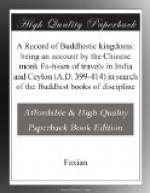All south from this is named the Middle Kingdom.(3) In it the cold and heat are finely tempered, and there is neither hoarfrost nor snow. The people are numerous and happy; they have not to register their households, or attend to any magistrates and their rules; only those who cultivate the royal land have to pay (a portion of) the grain from it. If they want to go, they go; if they want to stay on, they stay. The king governs without decapitation or (other) corporal punishments. Criminals are simply fined, lightly or heavily, according to the circumstances (of each case). Even in cases of repeated attempts at wicked rebellion, they only have their right hands cut off. The king’s body-guards and attendants all have salaries. Throughout the whole country the people do not kill any living creature, nor drink intoxicating liquor, nor eat onions or garlic. The only exception is that of the Chandalas.(4) That is the name for those who are (held to be) wicked men, and live apart from others. When they enter the gate of a city or a market-place, they strike a piece of wood to make themselves known, so that men know and avoid them, and do not come into contact with them. In that country they do not keep pigs and fowls, and do not sell live cattle; in the markets there are no butchers’ shops and no dealers in intoxicating drink. In buying and selling commodities they use cowries.(5) Only the Chandalas are fishermen and hunters, and sell flesh meat.
After Buddha attained to pari-nirvana,(6) the kings of the various countries and the heads of the Vaisyas(7) built viharas for the priests, and endowed them with fields, houses, gardens, and orchards, along with the resident populations and their cattle, the grants being engraved on plates of metal,(8) so that afterwards they were handed down from king to king, without any daring to annul them, and they remain even to the present time.
The regular business of the monks is to perform acts of meritorious virtue, and to recite their Sutras and sit wrapt in meditation. When stranger monks arrive (at any monastery), the old residents meet and receive them, carry for them their clothes and alms-bowl, give them water to wash their feet, oil with which to anoint them, and the liquid food permitted out of the regular hours.(9) When (the stranger) has enjoyed a very brief rest, they further ask the number of years that he has been a monk, after which he receives a sleeping apartment with its appurtenances, according to his regular order, and everything is done for him which the rules prescribe.(10)
Where a community of monks resides, they erect topes to Sariputtra,(11) to Maha-maudgalyayana,(12) and to Ananda,(13) and also topes (in honour) of the Abhidharma, the Vinaya, and the Sutras. A month after the (annual season of) rest, the families which are looking out for blessing stimulate one another(14) to make offerings to the monks, and send round to them the liquid food which may be taken out of the ordinary hours. All the monks come together in a great assembly, and preach the Law;(15) after which offerings are presented at the tope of Sariputtra, with all kinds of flowers and incense. All through the night lamps are kept burning, and skilful musicians are employed to perform.(16)




